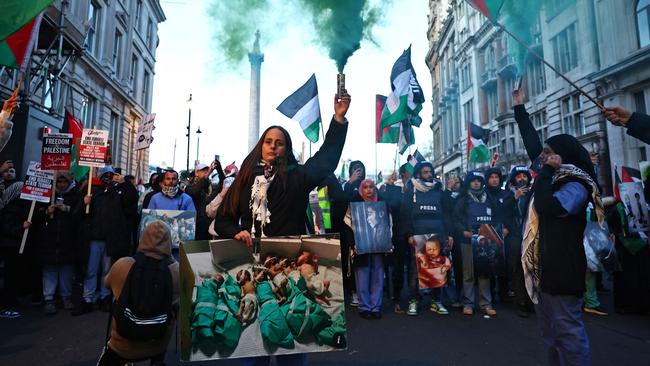Fears Iran will exploit Palestinian protests in Britain
A quarter of Tehran’s operations to kill or kidnap critics overseas were on UK soil. Counterterrorism experts fear the regime will next exploit the Palestinian protests.

Iran has generated at least 17 plots against UK targets, including abduction and murder attempts, since the start of last year - and law officials fear it is trying to radicalise “lone wolf” extremists to conduct further attacks.
New figures reveal that a quarter of Tehran’s overseas operations to target critics have been against Britain.
Following the outbreak of conflict between Israel and Tehran-backed Hamas, security officials are braced for the tempo of plots to increase and for a potential shift in focus from Iranian dissidents and opposition media to British Jews and politicians. Ministers believe Iran has already identified Jewish and Israeli targets in the UK for potential “future lethal operations”.
An investigation by The Sunday Times based on conversations with victims and western intelligence sources, as well as US court documents, shows the regime is using a series of proxies, including organised crime groups.
Law enforcement officials fear its latest tactic entails radicalising “lone wolf” extremists from afar. They believe that Iran has sought to exploit the pro-Palestinian protests that have taken place in central London since the October 7 Hamas massacre.
The Metropolitan Police recently issued an appeal to identify six thugs who were allegedly part of a mob that confronted a British-Iranian activist on one demonstration after he displayed the Israeli flag in a show of solidarity. Another person linked to the group has been charged with carrying a knife.
“Plainly events in the Middle East sharpen the possibility that Iran might decide to move into new directions,” Ken McCallum, the director-general of MI5, recently warned.
He said the conflict “could provide some form of twisted inspiration for some of our citizens to seek to mount some kind of attack”.
Last week a Spanish politician shot in the face at close range in Madrid accused Iran of attempting to assassinate him. Alejo Vidal-Quadras, 78, is an ally of an exiled Iranian opposition group. Three people - a British woman and two Spanish men - were detained. Since January 1 last year Iran has begun 67 overseas operations, according to Matthew Levitt, a former FBI official and director of counterterrorism and intelligence at the Washington Institute for Near East Policy, of which 17 (25 per cent) have targeted British residents or nationals. In mid-February, police chiefs stated publicly that they had foiled 15 plots.
Instead of deploying traditional spies operating under diplomatic cover to do its bidding in the field, Tehran is increasingly hiring criminals, unsuspecting private eyes and other proxies. “The more space you can create between yourself and pulling the trigger, the more comfortable it is,” said Levitt. “It provides you with reasonable deniability.”
In an investigation into the foiled kidnapping of the Iran critic Masih Alinejad, who was living in New York, US law enforcement officers uncovered a network of spies that had used private eyes in the UK and US to unwittingly carry out reconnaissance for Tehran. Alinejad, 47, has been a thorn in the side of the Islamic republic for well over a decade. In 2009, the Iranian-born journalist and Nobel peace prize nominee moved to Britain after exposing a parliamentary corruption scandal in Tehran.
She had received at least three threats to her safety which she reported to police. They included a incident in which an Iranian man posing as a postman tried to force his way into her home.
By February this year, the threat from Tehran had become so acute in Britain that Iran International, an independent television station operating out of offices in Chiswick business park, west London, was advised by counterterrorist police to cease transmissions.
Last month police opened a national unit to tackle the threat from Iran and other hostile states. Working closely with MI5, it will focus in part on Tehran’s use of proxies to target its enemies.
A security source said: “If criminal groups or private eyes take on work for the Iranian regime they will bring the weight of western intelligence services down on them, as well as that of law enforcement. It is simply not worth it. The consequences and legal price will be heavy.”
THE SUNDAY TIMES



To join the conversation, please log in. Don't have an account? Register
Join the conversation, you are commenting as Logout